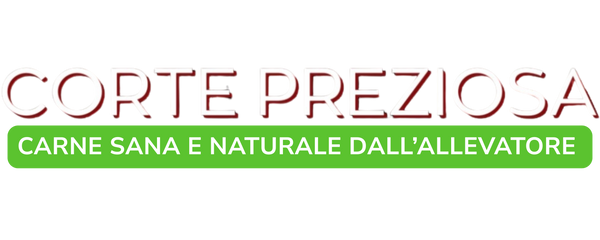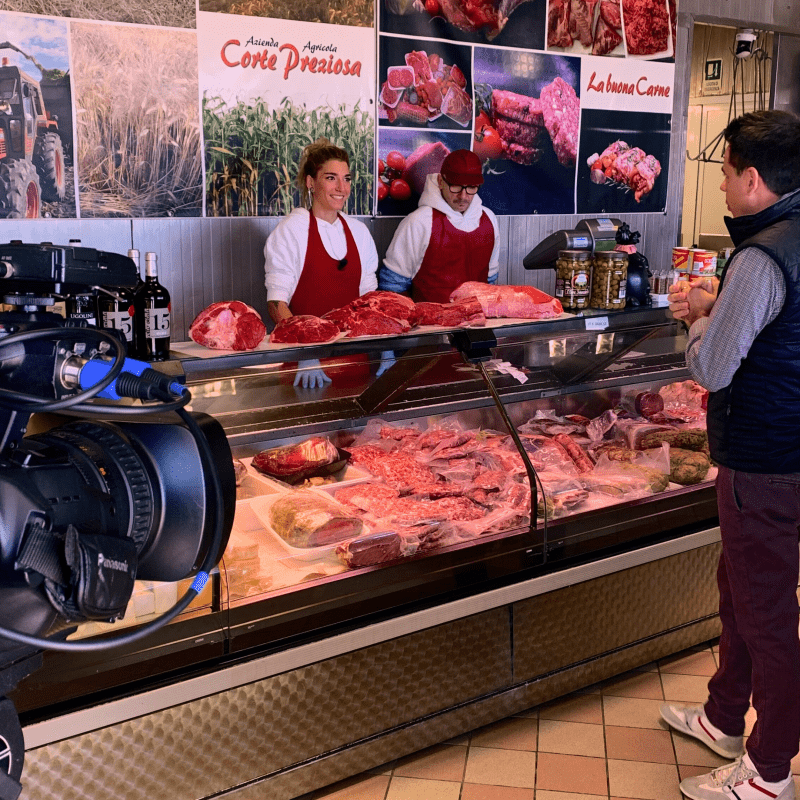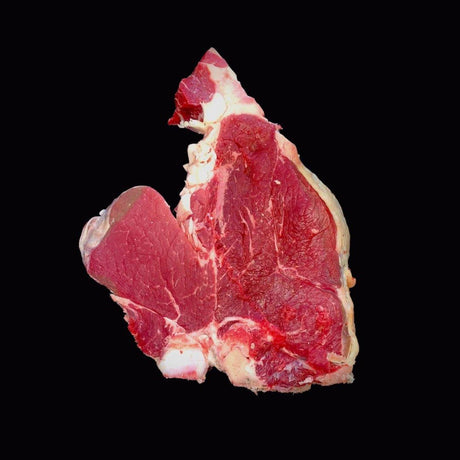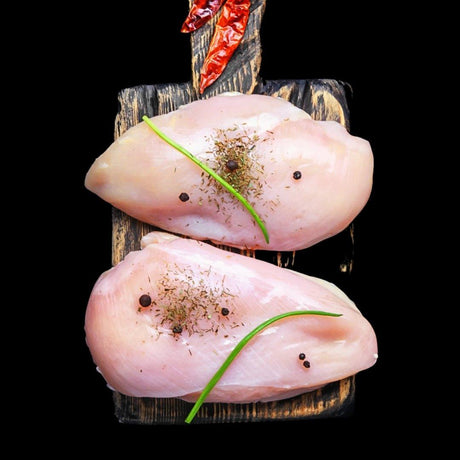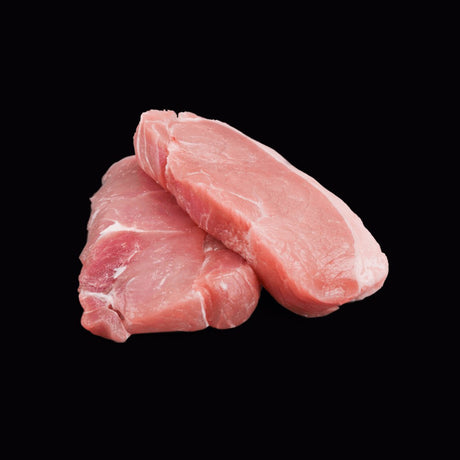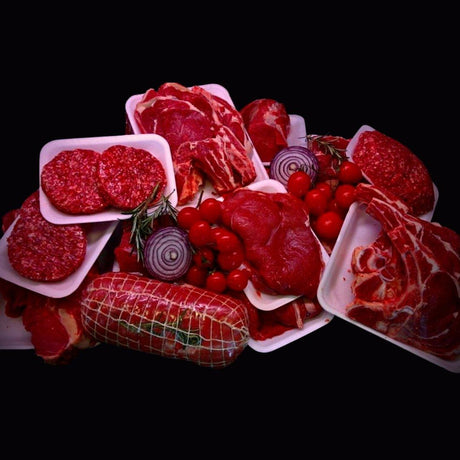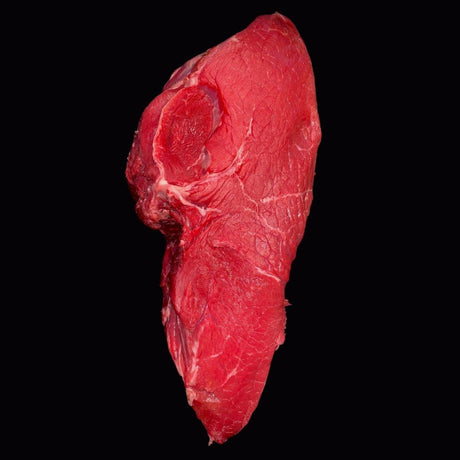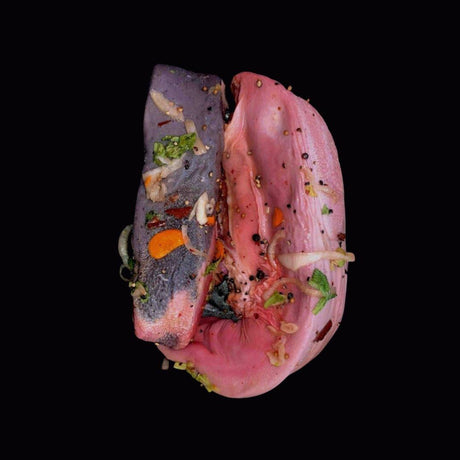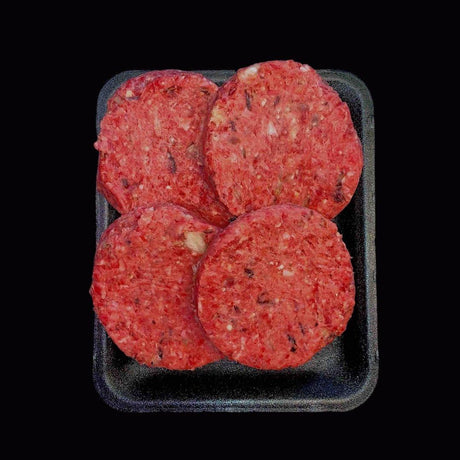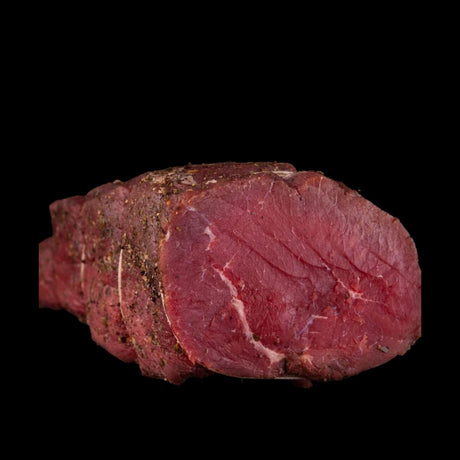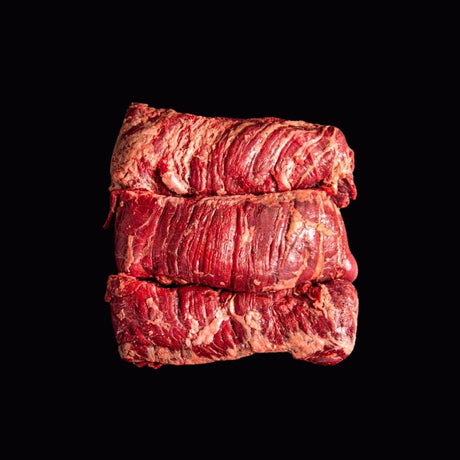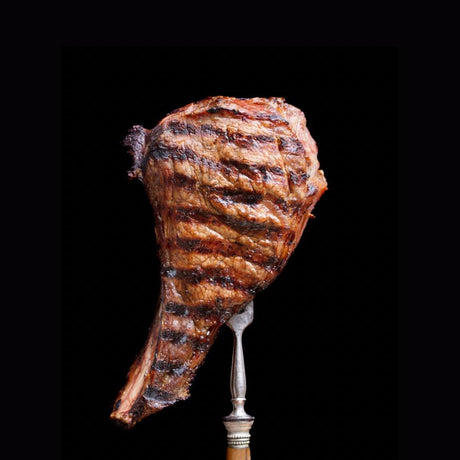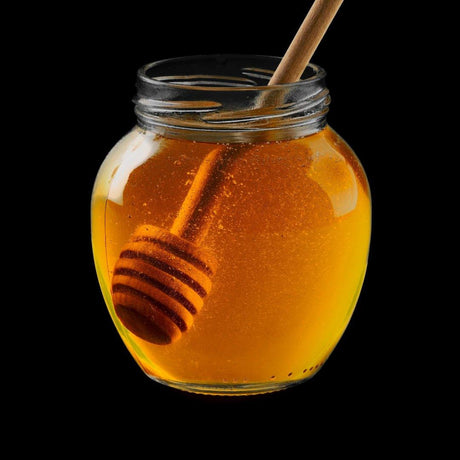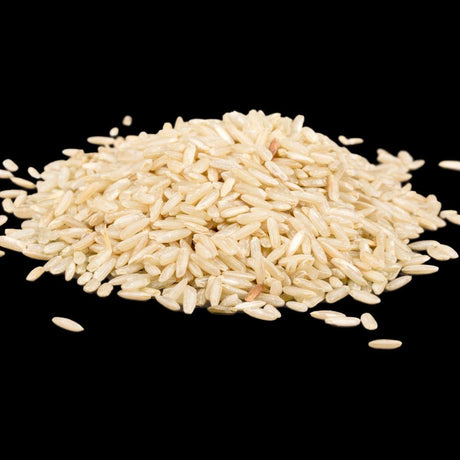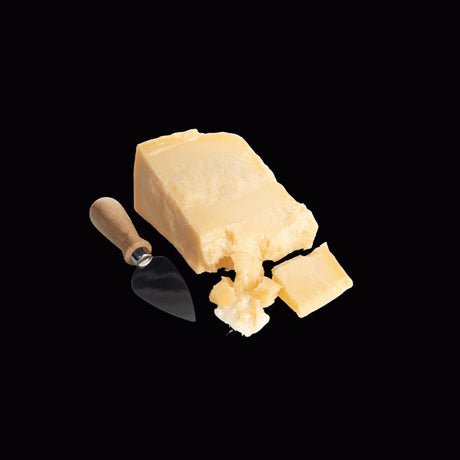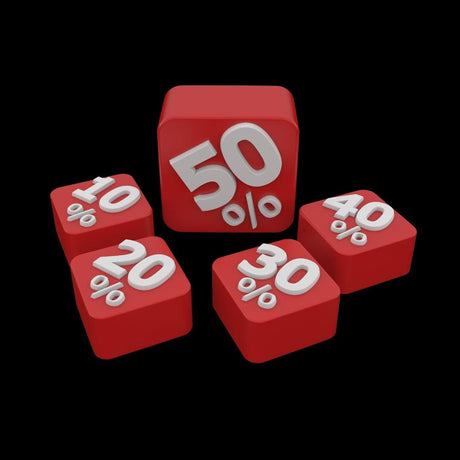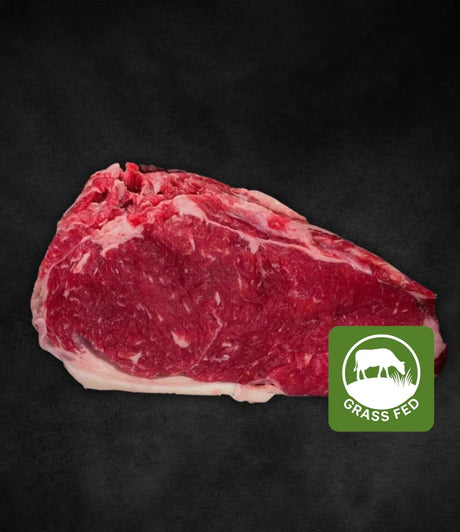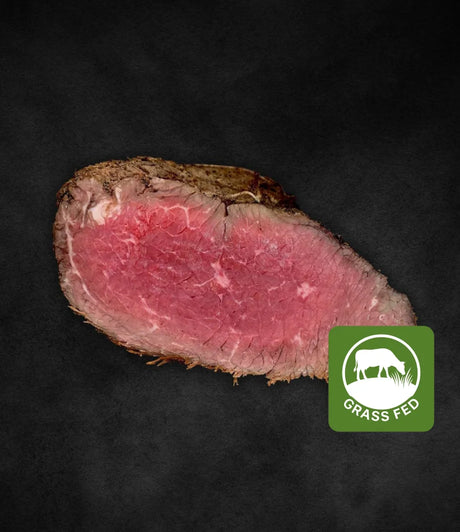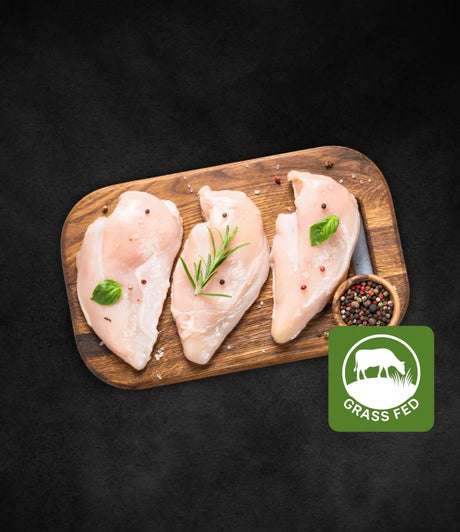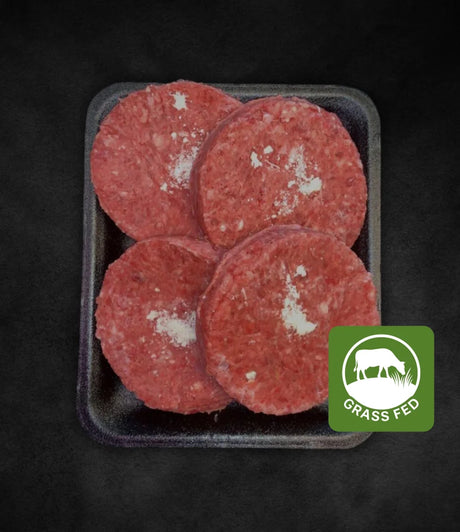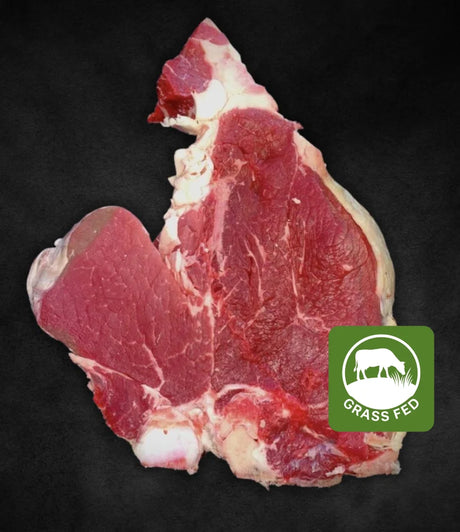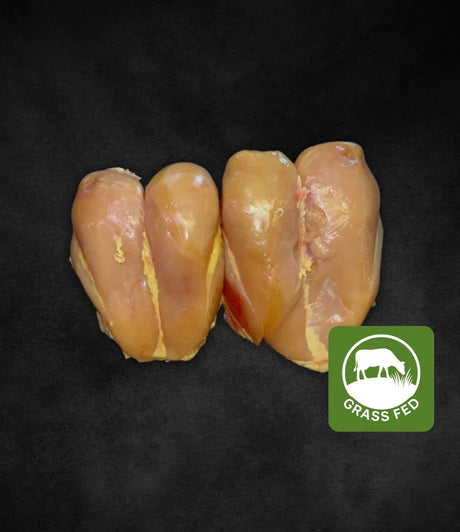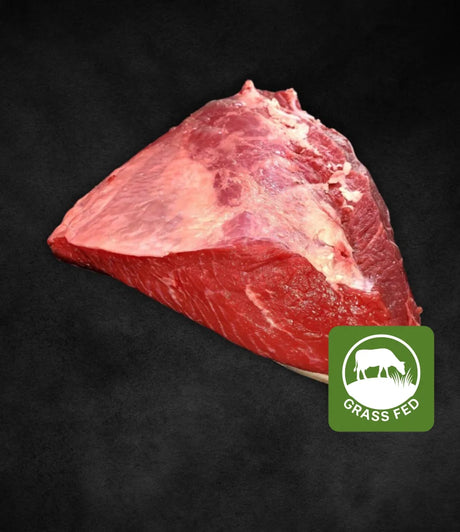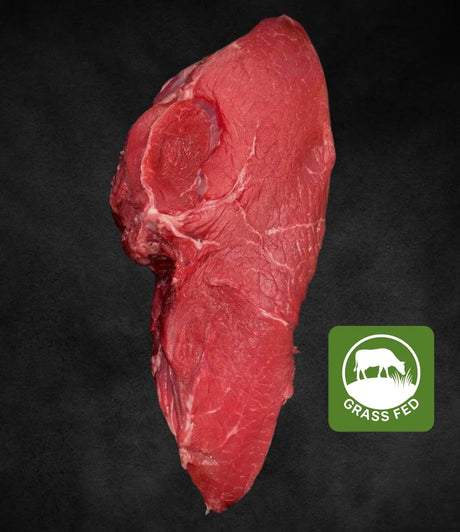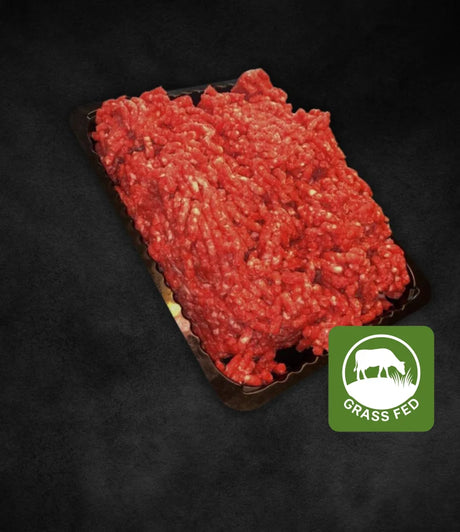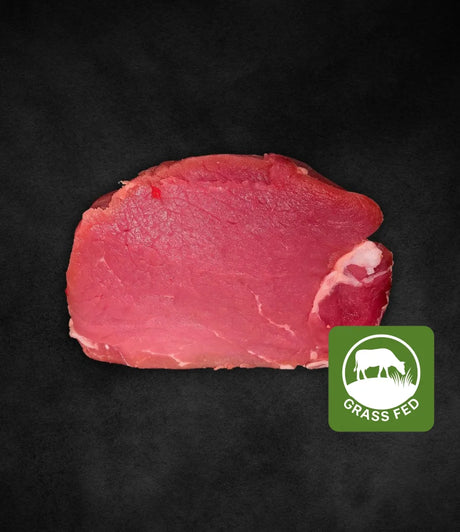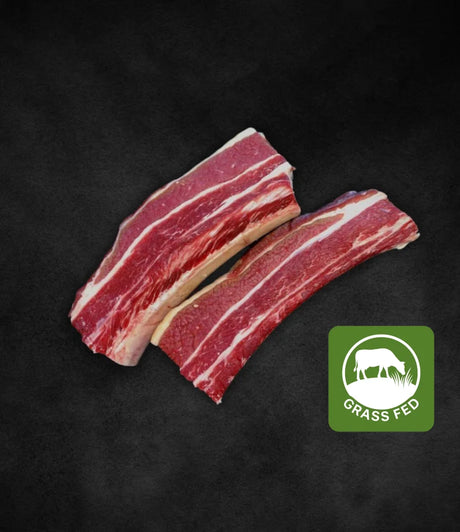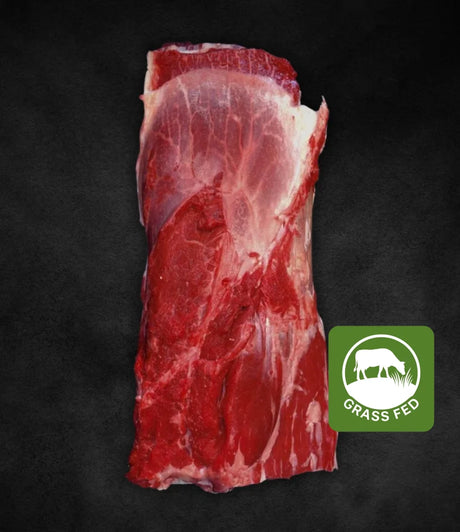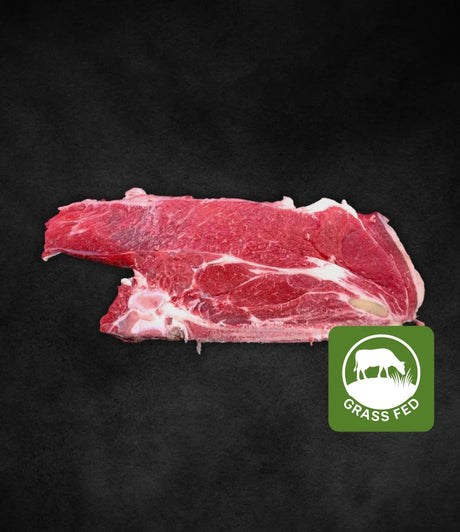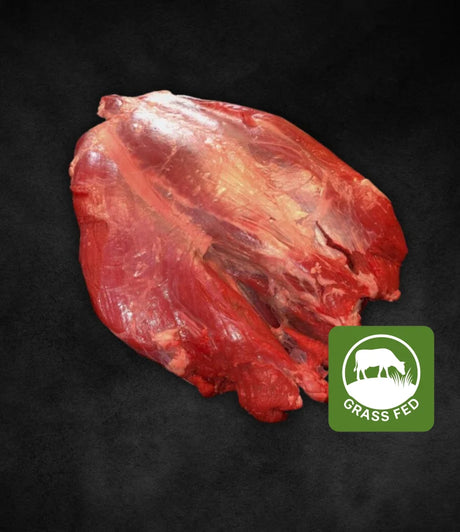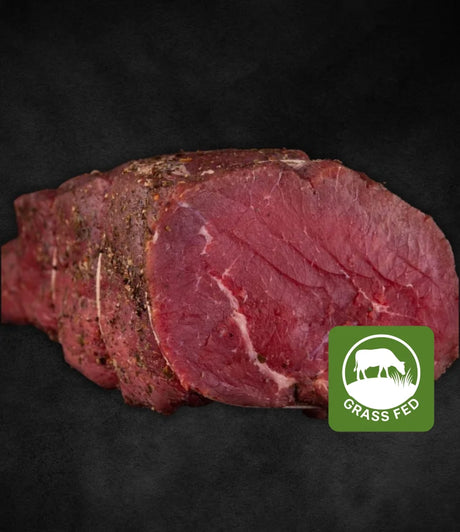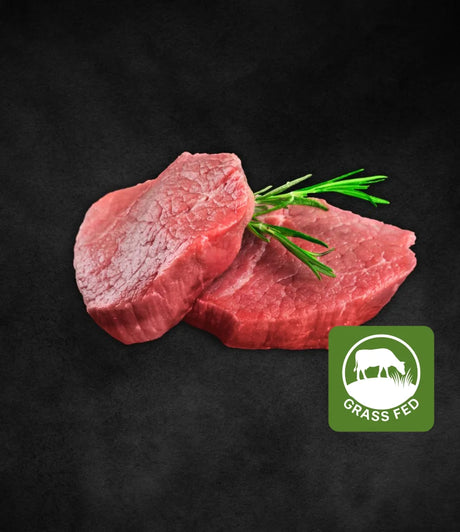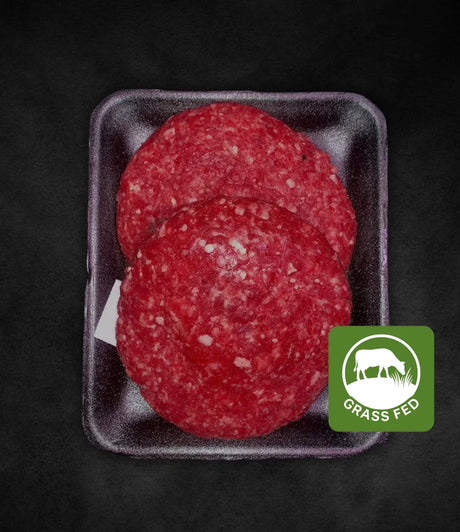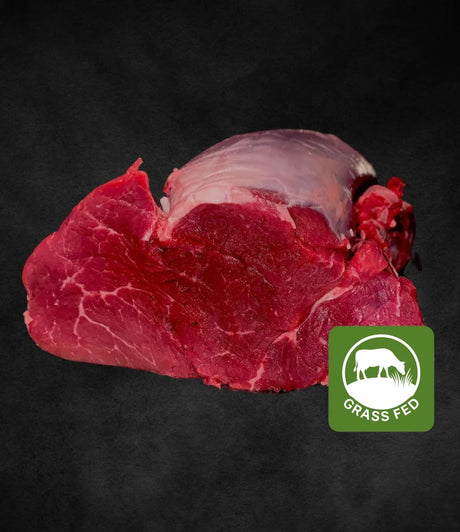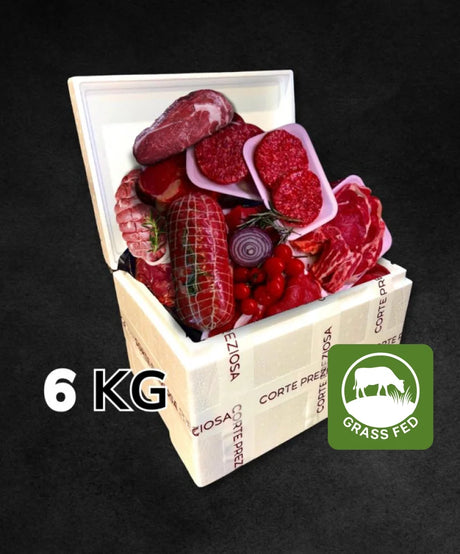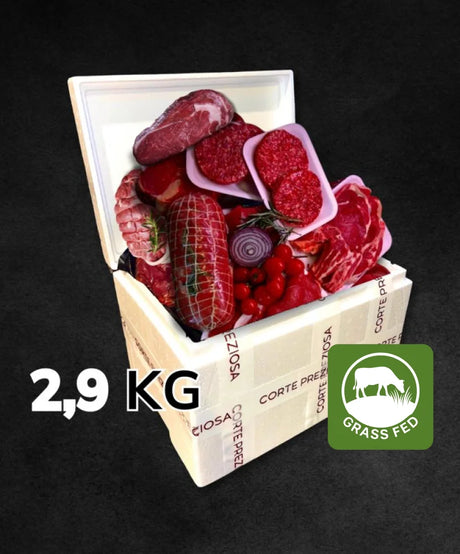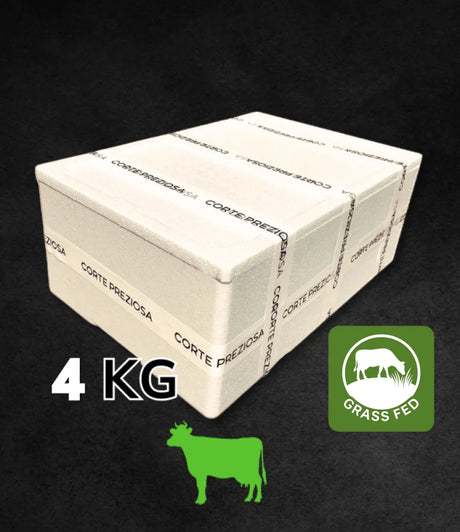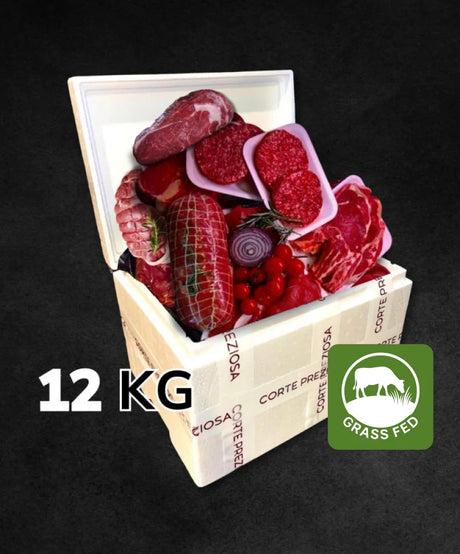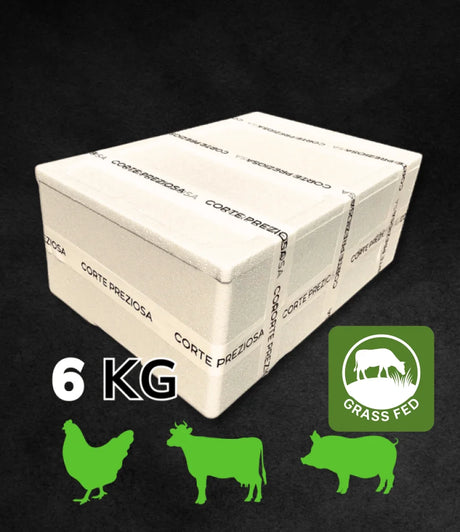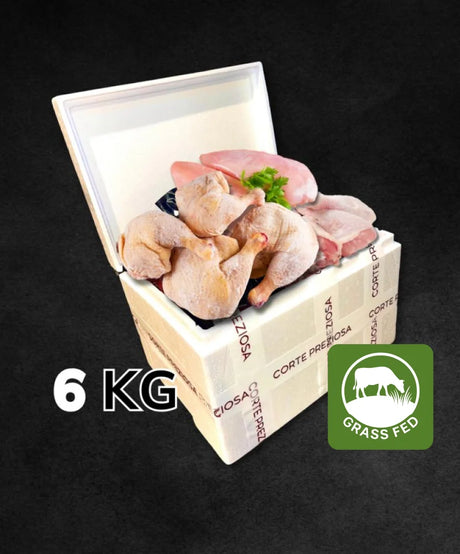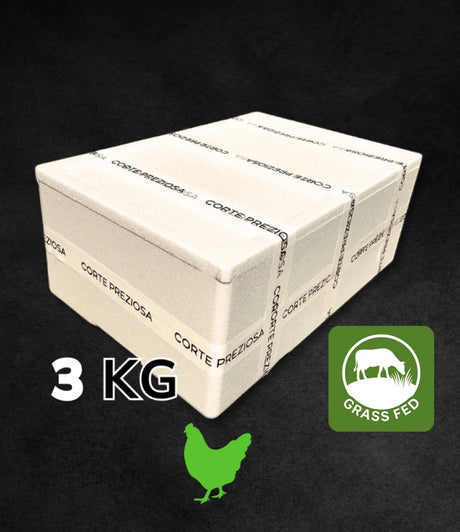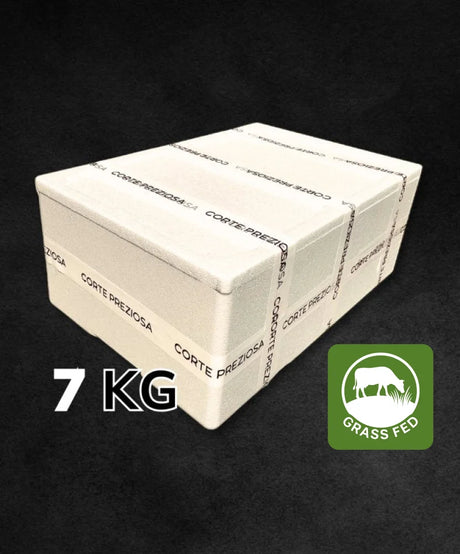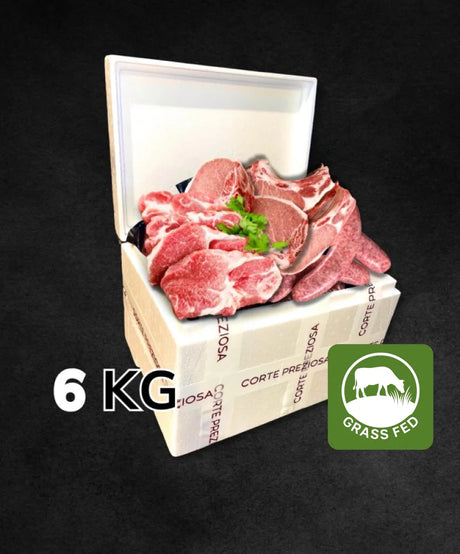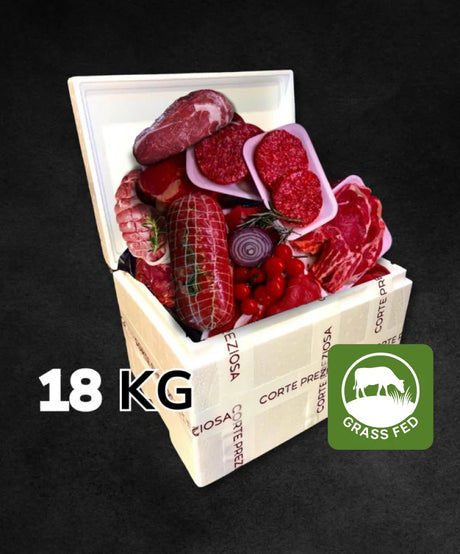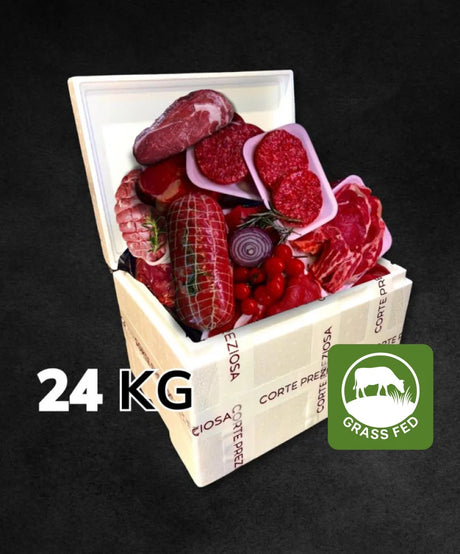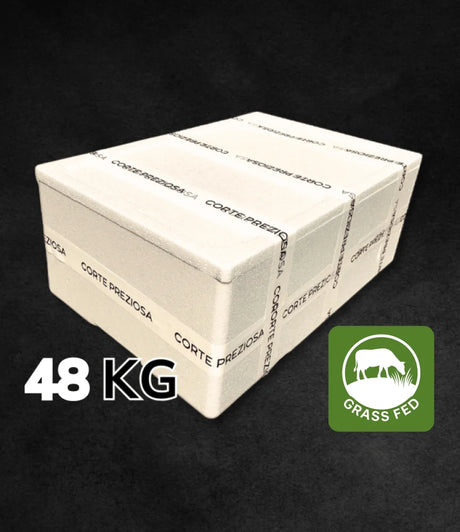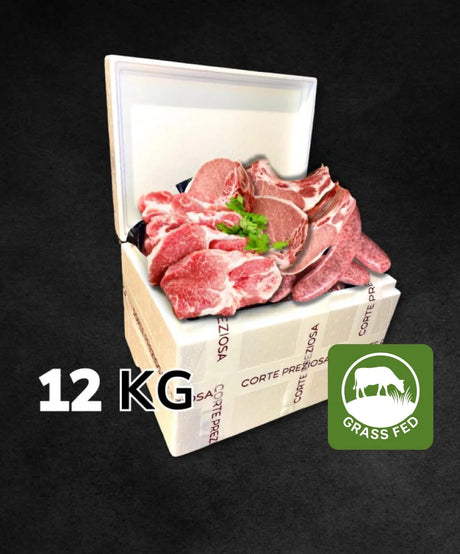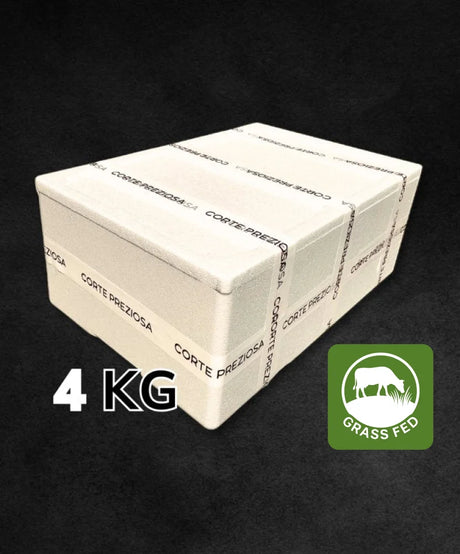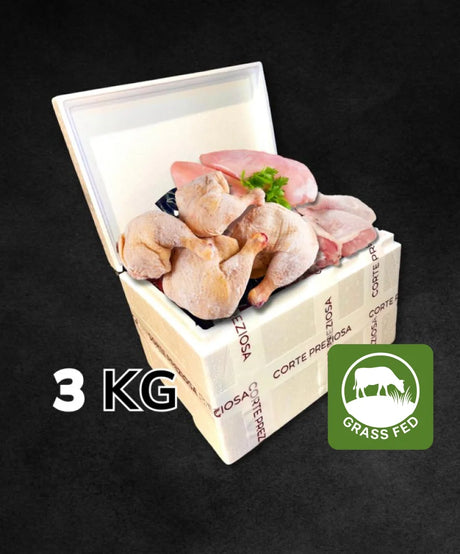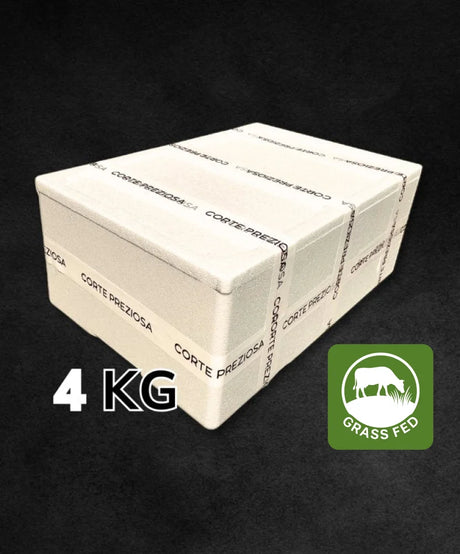Welcome to our blog, a space dedicated to exploring the world of Corte Preziosa through the voices of its protagonists. Here you will find all the interviews with members of this reality, who with passion, dedication and competence contribute to making every facet of our work unique. Every story told, every experience shared, is a piece that enriches our vision and allows us to offer our readers a privileged look at what happens behind the scenes. Happy reading and happy discovery!
-------------------------------------------------------------------------------------
Interview with Claudio Pelizzardi: Ethics and Transparency in the Agriculture and Meat Sector
Hosted by Il Fatto Alimentare
Il Fatto Alimentare (IFA): Good morning Claudio, thank you for agreeing to speak with us. Let's start with a fundamental question: why are ethics and transparency crucial issues in the agricultural and meat sectors today?
Claudio Pelizzardi (CP): Good morning and thank you for the invitation. I believe that ethics and transparency are the pillars on which trust between producers and consumers is based. In an increasingly informed and attentive market, clarity on production practices—from breeding to slaughter—not only guarantees food safety, but also ensures animal welfare and environmental sustainability. This approach, in addition to meeting consumer expectations, allows us to raise the quality standards of the entire supply chain.
IFA: The modern consumer seems to be increasingly oriented towards traceable products. How is the food supply chain responding to this growing demand?
CP: Traceability has become essential. Thanks to the adoption of advanced technologies—such as digital systems, blockchain, and IoT devices—every stage of production can be monitored and documented. This allows not only to trace the origins of the product, but also to intervene promptly in the event of anomalies. In essence, we are witnessing a revolution that strengthens the bond of trust between those who produce and those who consume, making the entire supply chain more transparent and responsible.
IFA: When it comes to ethics in animal treatment, what are the main challenges the sector faces?
CP: The ethical challenges are many and concern above all the respect and well-being of animals throughout the production cycle. From breeding, where it is essential to guarantee dignified conditions and adequate space, to slaughter, where it is essential to apply methods that minimize stress and pain, each phase must be managed with extreme care. The difficulty lies in balancing the need for productivity with the duty to respect animal life, adopting practices that are both sustainable and ethically responsible.
IFA: What virtuous practices can already be found in the sector to ensure animal welfare?
CP: We have seen a significant evolution in recent years. Many farms have adopted specific certification systems for animal welfare, which include regular checks and international standards. In addition, continuous training of operators and the use of technologies to monitor the animals' conditions have contributed to creating more humane farming environments. Even at the time of slaughter, the adoption of more respectful methods and the integration of quality control procedures represent significant steps forward.
IFA: How would you describe the current relationship between producers and consumers, and what role does transparent communication play in this context?
CP: The relationship between producers and consumers is evolving towards greater interaction and exchange of information. Today, thanks to social media and traceability systems, the consumer has access to detailed data on each production stage. This transparency not only strengthens trust, but also encourages producers to maintain high standards, knowing that every aspect of their operations can be verified. In this scenario, communication becomes a key element to create a food ecosystem in which quality and ethics are shared and constantly improved.
IFA: What is the role of control bodies and regulations in ensuring quality and ethics along the supply chain?
CP: Control bodies and regulations play an essential role. They ensure that safety, quality and animal welfare standards are respected, monitoring the entire production chain. These controls, often supported by certifications and periodic audits, act as a guarantee for the consumer, allowing any critical issues to be identified and corrected. Furthermore, an updated regulatory framework encourages producers to invest in innovative technologies and practices, creating a virtuous circle of continuous improvement.
IFA: Looking to the future, what prospects do you see for the sector in terms of ethics, transparency and sustainability?
CP: The outlook is very encouraging. Technological innovation, combined with growing ethical awareness, promises to further revolutionize the sector. Aspects such as the integration of blockchain for even more precise traceability and the use of artificial intelligence to optimize production processes are just some of the solutions I see on the horizon. These innovations will not only respond to consumer needs, but will also help build a more sustainable, efficient and environmentally and animal-friendly production model.
IFA: Finally, what message would you like to send to producers and consumers regarding shared responsibility in this area?
CP: My message is clear: ethics and transparency are not just goals to be achieved, but guiding principles that must inspire every stage of food production. Producers and consumers are partners in a common journey towards a more sustainable and responsible system. Only through a shared commitment—based on trust, communication and the constant search for improvement—will we be able to guarantee a future in which the food we put on the table reflects values of respect, quality and sustainability.
IFA: Thank you very much, Claudio, for these precious reflections and for the time dedicated to this interview.
CP: Thank you for the opportunity. It is always a pleasure to contribute to the debate on issues so important for our future.
-------------------------------------------------------------------------------------
RadioVerona Interview – Marco Pelizzardi and Natural Meat
Hosted by RadioVerona
Host (RadioVerona): Good morning to all RadioVerona listeners! Today we have the pleasure of hosting Marco Pelizzardi, an entrepreneur in the agri-food sector, to talk about an innovative project: the production of natural meat without the use of industrial feed and its distribution via e-commerce. Marco, welcome!
Marco Pelizzardi: Thank you, it's a pleasure to be here!
Host: Let's start right away with a key question: what exactly does it mean to produce natural meat without the use of industrial feed?
Marco Pelizzardi: It means going back to the origins, promoting a diet based exclusively on natural fodder, free grazing and cereals grown without chemical treatments. This guarantees healthier meat, with an authentic taste and a completely transparent supply chain.
Host: And what are the benefits for the consumer?
Marco Pelizzardi: The benefits are many. From a nutritional point of view, the meat is more digestible, with a better balance of fats and proteins. Furthermore, without the use of artificial feed, we reduce the environmental impact and guarantee the well-being of the animals.
Host: Very interesting! And how does e-commerce distribution work?
Marco Pelizzardi: We have created an online platform where customers can buy directly from our company. The meat is vacuum-packed and shipped with refrigerated transport, ensuring freshness and quality until home delivery. In addition, customers can choose specific cuts or subscribe to monthly boxes with personalized selections.
Host: A system that combines tradition and innovation! How is the market responding to this initiative?
Marco Pelizzardi: Very good! There is a growing attention towards food quality and sustainability. Customers want to know what they are eating and where the product comes from. Online sales allow us to offer traceability and a direct relationship with the consumer.
Host: A project that seems to have a great future! Marco, one last question: what are the next steps?
Marco Pelizzardi: We are working to expand our network of partner farms that share our philosophy and to develop new sustainable packaging solutions. Furthermore, we want to expand distribution in new areas and make our product more and more known.
Host: Marco, thank you for being with us and for telling us about this wonderful initiative!
Marco Pelizzardi: Thank you and greetings to all the listeners!
Host: And that concludes our interview on RadioVerona. Keep following us for more stories of innovation and sustainability!
-------------------------------------------------------------------------------------
Interview with Marco Pelizzardi: "How Corte Preziosa is revolutionizing sustainable meat"
By Forbes Startup Under 30
At just 29 years old, Marco Pelizzardi is the legal representative of Corte Preziosa, a company that, with five generations of history, is redefining the future of meat production. Raised in the green lands of Serravalle Po, in the Mantua area, Marco has brought innovation and digital strategy to a traditional sector, with an eye always on sustainability. In this exclusive interview, he tells us how the family vision and technology are shaping the future of the food industry.
Forbes: Marco, Corte Preziosa has a long history. How did you start your journey in the family business?
Marco Pelizzardi: Our story starts a long time ago, initially with milk production. Over time, we understood that we could offer more, focusing on the quality of meat. My father had the intuition to create an e-commerce in 2005, when few still believed in the online sale of meat. I grew up with this mentality and today my role is to carry on this vision, combining tradition and innovation.
Forbes: What are the strategies that distinguish you in the market?
Marco Pelizzardi: Total transparency is our strong point. We manage the entire production process: from breeding to slaughtering to delivery. This allows us to guarantee traceability, quality and sustainability. Furthermore, we use advanced digital marketing strategies to intercept the right customers and we have logistics that guarantee delivery within 24 hours throughout Europe, keeping the meat fresh, never frozen. We focus a lot on the narration of our production process through social content and storytelling to make consumers understand the importance of quality and the care we put into every phase.
We have built a triangular business model based on three fundamental pillars: marketing, production and transport, all managed internally. This allows us to have absolute control over quality and distribution, avoiding intermediaries and guaranteeing our customers an excellent product at competitive prices. Each phase is optimized to maintain high standards of efficiency and sustainability, without compromising the authenticity of our work.
Forbes: Nutrition and animal welfare are key issues today. How do you manage them in Corte Preziosa?
Marco Pelizzardi: Animal welfare is a top priority for us. Our animals are raised in large spaces, with a limited number of animals per pen, to ensure freedom of movement and reduce stress. We exclusively raise Limousine heifers, a prized breed recognized for the tenderness and organoleptic qualities of their meat. Their diet is taken care of down to the smallest details: we use corn, barley, hay and soy, ensuring a balanced and natural diet, without the use of preventive antibiotics or growth hormones. This approach allows us to obtain a product of the highest quality, which is reflected in the flavor and nutritional properties of our meat.
Forbes: What checks do you carry out to ensure the quality of the final product?
Marco Pelizzardi: Every stage of production is subject to rigorous controls. We carefully monitor the growth of the animals, their diet and their well-being. During slaughter, we ensure that all hygiene and health standards are respected at the highest level. In addition, each batch of meat is analyzed to guarantee freshness, nutritional values and the absence of contaminants. Thanks to this closed supply chain, we can offer consumers a product that is controlled in every detail.
Forbes: Are you looking at new markets to expand Corte Preziosa?
Marco Pelizzardi: Absolutely. We are analyzing the potential of strategic markets such as Germany, Switzerland, Poland and Austria, where the demand for quality meat is high and the consumer is very attentive to sustainability. At the same time, we are exploring expansion opportunities in America and China, two markets with different needs but with a growing interest in premium meat and transparent supply chains. We adapt our marketing and logistics strategies based on local purchasing habits, always guaranteeing our quality standard.
Forbes: How do you preserve tradition in your work?
Marco Pelizzardi: Tradition is the heart of Corte Preziosa. Despite technological innovation and the growth of the company, we are committed to keeping alive the artisanal techniques that distinguish us. The meat processing still follows traditional methods, respecting times and processes that guarantee the authentic quality of the product. Even the direct relationship with customers, such as sales at farmers' markets, is an aspect that we do not want to lose, because it represents the deep bond with the territory and the trust that we have built over time.
Forbes: Sustainability and the meat industry often don’t go hand in hand. How do you address this challenge?
Marco Pelizzardi: For us, sustainability is an essential value. Our photovoltaic system allows us to reduce our environmental impact, and we are working on a biogas system to make production even greener. Furthermore, we use recycled materials for packaging and guarantee animals adequate space for healthy and natural growth. We are also studying new solutions for sustainable logistics, reducing our impact during transport.
Forbes: What are your future goals?
Marco Pelizzardi: We want to strengthen our digital presence and improve our distribution, expanding the logistics network in other European countries. In addition, we are studying new cuts and innovative products to meet the needs of an increasingly diverse audience. Our goal is also to improve the communication of our sustainable supply chain, creating greater engagement with the customer through immersive experiences, such as interactive videos and virtual visits to our farms.
-------------------------------------------------------------------------------------
Interview with Claudio Pelizzardi: Impact of Climate Change on Agriculture and Meat
Led by Greenpeace
Greenpeace:
Good morning Claudio, thank you for accepting this interview. Let's start with a fundamental question: how are climate changes affecting agricultural production and the meat sector?
Claudio Pelizzardi:
Good morning to you, it's a pleasure to talk about it. Climate change is having a profound impact on agriculture and the meat sector. On the one hand, we are seeing more intense droughts and higher temperatures that damage crops, reducing yields and putting farmers in difficulty. On the other hand, animal farming is strongly affected by these changes, with animals suffering from the heat and the scarcity of resources such as water and food. This leads to a decrease in productivity and higher costs, creating a spiral that threatens the economic stability of the entire sector.
Greenpeace:
How is natural resource management changing in response to a changing climate?
Claudio Pelizzardi:
Managing natural resources has become a complex challenge. In a changing climate, we face increasing water scarcity, more delicate management of agricultural land, and a greater focus on resource efficiency. Farmers are forced to review their practices, investing in more efficient irrigation technologies, choosing crop varieties that are more resistant to drought or high temperatures, and trying to reduce the impact of their activities on the environment. For the meat sector, natural resources must be managed even more carefully, as livestock farming requires large amounts of water and animal feed. The challenge is to balance the growing demand for meat with the need to protect the environment.
Greenpeace:
What are the main future challenges that farmers and meat producers will have to face in a context of climate instability?
Claudio Pelizzardi:
The challenges are many. First of all, there is the uncertainty related to extreme weather conditions, which can affect crops and animal health in unpredictable ways. Water scarcity is another growing problem: not only crops but also animal feed are highly dependent on this resource. In addition, farmers will have to face higher costs for energy and water supplies, as well as for adapting to new environmental regulations that will increasingly require the adoption of more sustainable practices. For meat producers, there is also the growing demand for protein alternatives, such as plant proteins or lab-grown meat, which is shaking up the traditional farming model. Overall, the resilience of the sector will depend on the ability to adapt quickly, diversifying production and innovating management methods.
Greenpeace:
Greenpeace has long stressed the importance of a more sustainable agricultural system. What are the solutions that could mitigate the effects of climate change on agriculture and meat?
Claudio Pelizzardi:
The future of agriculture and meat must necessarily go through the large-scale adoption of more sustainable practices. In the agricultural sector, for example, precision agriculture, which uses technologies to monitor and optimize the use of resources, is one of the most promising solutions. Investing in climate-resistant crops and promoting holistic soil management can reduce the environmental impact and improve the resilience of crops. In the meat sector, an important step is to reduce the ecological footprint, for example by improving pasture management and reducing greenhouse gas emissions related to intensive livestock farming. Furthermore, the promotion of protein alternatives, such as plant-based proteins and cultured meats, could ease the pressure on natural resources, decreasing the impact on the climate.
Greenpeace:
Finally, what concrete actions could both producers and consumers take to address the climate crisis linked to agriculture and meat?
Claudio Pelizzardi:
Producers and consumers have a key role to play in this change. Producers must invest in green technologies and environmentally friendly production methods, minimizing the use of resources and promoting regenerative agricultural practices. It is also important for the food industry to adapt to new consumer demands, offering sustainable and responsible products. For consumers, awareness is key: choosing foods from environmentally friendly supply chains and promoting a more balanced diet, with a lower impact on the climate, is an important step. A more conscious consumption of meat, for example, can significantly reduce the global ecological footprint. Ultimately, we must understand that climate change is a challenge that affects everyone and that each of us, with our daily choices, can contribute to a more sustainable future.
Greenpeace:
Thank you so much, Claudio, for sharing these thoughts with us and for your commitment to a more responsible and sustainable agriculture and meat sector.
Claudio Pelizzardi:
Thank you for the opportunity. It is essential to continue discussing these issues to raise awareness and stimulate positive changes.
-------------------------------------------------------------------------------------
Interview with Claudio Pelizzardi: Animal Welfare as a Fundamental Pillar in Companies
By Il Sole 24 Ore - Agriculture
Il Sole 24 Ore - Agriculture: Today we have the pleasure of speaking with Claudio Pelizzardi, an expert in ethics and animal welfare, to discuss an increasingly relevant topic: animal welfare in agricultural and livestock companies. Claudio, thank you for joining us today. To begin, can you explain what exactly you mean by "animal welfare"?
Claudio Pelizzardi: Thank you for the opportunity. “Animal welfare” goes beyond the simple absence of physical suffering. It is about ensuring that animals can live in an environment that meets all their biological, psychological and social needs. This includes, for example, the ability to express natural behaviors, have access to quality food and water, live in healthy and safe environments, and enjoy an emotional state that avoids stress and suffering.
Il Sole 24 Ore - Agriculture: A very current topic. How is the concept of animal welfare applied in practice within agricultural companies? What are the main challenges?
Claudio Pelizzardi: Animal welfare on farms is a principle that must be integrated into every phase of the production process, from daily management to the design of structures. The main challenges concern maintaining a balance between the needs of animals and the economic objectives of companies. However, the adoption of policies that protect animal welfare is not only an ethical obligation, but an opportunity to improve the quality of the final product and to strengthen the reputation of the company. A conscious and responsible management often leads to greater productivity and lower costs related to animal diseases and stress.
Il Sole 24 Ore - Agriculture: What are the fundamental pillars that a farm should adopt to guarantee animal welfare?
Claudio Pelizzardi: There are several essential pillars. First, training and awareness of all staff, who must be constantly updated on best practices in terms of animal welfare. Second, the adoption of adequate spaces: the structures must allow animals to move freely and express their natural behaviors. Another pillar is the quality of the food, which must be balanced and meet the nutritional needs of the animals. Furthermore, it is essential to continuously monitor the health and behavior of the animals, also using advanced technologies that can detect signs of stress or discomfort. Finally, the commitment to innovation is crucial: companies should always be looking for new solutions to improve the life of animals, such as breeding systems that minimize the risk of disease and stress.
Il Sole 24 Ore - Agriculture: Innovation plays a key role. Can you give us some examples of how agricultural companies can implement these practices in a concrete way?
Claudio Pelizzardi: Absolutely. Take, for example, a dairy farm. A farm that adopts animal welfare management could design stables that allow plenty of space for movement, access to soft and clean bedding, and ventilation systems that maintain a healthy climate. In terms of nutrition, it is essential to offer high-quality feed, balanced according to the needs of individual animals. Furthermore, the use of health monitoring technologies, such as wearable sensors that detect body temperature or stress signals, can be crucial to prevent diseases and improve overall well-being. Another interesting example concerns the introduction of environmental enrichment practices, such as the possibility for animals to interact with other individuals or to have access to stimuli that promote their psychological well-being.
Il Sole 24 Ore - Agriculture: Speaking of legislation, what role do animal welfare regulations play? And how do companies relate to these laws?
Claudio Pelizzardi: Regulations are essential to establish minimum standards of animal welfare, but they are often not sufficient to guarantee an excellent approach. Farms must go beyond legal requirements and adopt practices that exceed these standards, integrating animal welfare as an integral part of their corporate culture. However, legislation must evolve to respond to new challenges and opportunities in agriculture, incentivizing virtuous practices through tax breaks, quality certifications and rigorous monitoring. Companies that respect high ethical standards not only contribute to a better quality of animal life, but can also benefit from a competitive advantage, especially on the international market where sustainability and respect for animals are increasingly required by consumers.
Il Sole 24 Ore - Agriculture: Claudio, to conclude, what message would you like to leave to the agricultural companies and farmers who are reading us?
Claudio Pelizzardi: My message is clear: investing in animal welfare is not only an ethical choice, but a decision that brings concrete benefits in terms of quality, productivity and sustainability. Every farm has the responsibility to ensure that animals are treated with respect and care, but at the same time can benefit from this attention. In an increasingly aware market, responsible animal management can be a key to success. It is not about making compromises, but about adopting an approach that sees animal welfare as a pillar for healthier, more productive and sustainable agriculture.
Il Sole 24 Ore - Agriculture: Thank you for your time and for sharing your valuable thoughts. It was a pleasure to discuss such a crucial topic with you.
Claudio Pelizzardi: The pleasure was mine, thank you again for the opportunity to talk about a topic that, I believe, should be increasingly at the center of agricultural policies and business strategies.
-------------------------------------------------------------------------------------
Interview with Massimo and Giada Pelizzardi: The Processes in the Corte Preziosa Laboratory
Of Earth and Life
Terra e Vita: Today we have the pleasure of speaking with Massimo and Giada Pelizzardi, managers of the Corte Preziosa laboratory, a company that stands out for the care and quality with which the animals coming from their farm are treated. Massimo, Giada, thank you for accepting this interview. To begin, can you tell us how the Corte Preziosa laboratory was born and what is its main purpose?
Massimo Pelizzardi: Thank you for the opportunity to talk about it. The Corte Preziosa laboratory was born with the intention of integrating quality breeding with a manufacturing process that respects tradition but is also innovative and sustainable. Our mission is to guarantee finished products that are the result of an ethical production cycle, which goes from the selection and care of the animals to the final stages of transformation. Each single phase is carefully monitored to obtain meat and products of the highest quality, while respecting the environment and the animals.
Terra e Vita: Speaking of quality and respect, can we go into more detail about the main processes that take place in the Corte Preziosa laboratory? How are the animals treated and what techniques are used to guarantee their quality?
Giada Pelizzardi: Every stage of the process, from slaughter to final transformation, is managed with the utmost attention. When the animals arrive at the laboratory, they are welcomed in a calm environment, in order to reduce stress to a minimum. This is essential, not only for the respect of the animals, but also for the quality of the final product. The approach is that of a slow and controlled slaughter, which allows us to best preserve the meat, avoiding compression or damage to the tissues. We also use innovative conservation and seasoning systems, which ensure maximum freshness and taste.
Massimo Pelizzardi: Exactly. One of the crucial phases is slaughter, which we carry out following a rigorous animal welfare protocol. Calm and respect are essential to obtain high-quality meat. After slaughter, each animal is treated separately to avoid cross-contamination, so that each individual portion of meat maintains unique characteristics. Subsequent processing, such as the preparation of cured meats or sausages, is done with artisanal methods but always in compliance with food safety and quality standards.
Terra e Vita: Many consumers are interested in understanding how a farm like yours manages to integrate traditional practices and innovation. How do you combine these two aspects in your laboratory?
Giada Pelizzardi: The combination of tradition and innovation is our strong point. On the one hand, we maintain artisanal methods that preserve the taste and quality that only slow and careful processing can offer. On the other, we use the most modern technologies to guarantee food safety, efficiency and respect for the environment. For example, we use digital monitoring systems that allow us to control the temperature and humidity of the maturing cells in real time, optimizing the processes without compromising quality.
Massimo Pelizzardi: I would add that innovation is not just about tools or techniques, but also about the philosophy that underpins all our work. Every choice we make, from animal management to product distribution, is based on a sustainable approach. For example, we use eco-friendly packaging and are committed to minimizing the environmental impact of our laboratory.
Terra e Vita: A fundamental aspect, therefore, is also sustainability. How do you address this theme within the Corte Preziosa laboratory?
Massimo Pelizzardi: Sustainability is a core value for us. In addition to caring for the environment in which we work and paying attention to waste, we are committed to minimizing the impact of the production process. For example, we try to optimize the use of energy resources, using renewable sources and energy saving systems, to make each phase of the production cycle as sustainable as possible. At the same time, we comply with environmental regulations and work to minimize the carbon footprint of our business.
Giada Pelizzardi: Furthermore, let's not forget that sustainability also comes from the choice of raw materials and the management of farms. We are very careful to select animals responsibly, with particular attention to their nutrition, health and well-being throughout their lives. Our goal is to ensure that each animal grows in optimal conditions, without stress and with the right space to move and grow, while respecting the environment.
Terra e Vita: Looking to the future, what are the next challenges you set yourselves as a Corte Preziosa laboratory?
Giada Pelizzardi: The biggest challenge is to continue to innovate while maintaining our commitment to quality and respect for the environment. We want to constantly improve our practices and invest in new technologies that allow us to work even more efficiently and sustainably. In the future, we also hope to expand our product range, exploring new forms of transformation, such as the introduction of new types of cured meats or cured meats, which always reflect our values.
Massimo Pelizzardi: As for the laboratory, we will continue to focus on quality, trying to ensure that every product that comes out of Corte Preziosa is the result of ethical, transparent and high-quality workmanship. The challenge is to continue to grow while maintaining these values, without ever compromising.
Terra e Vita: Massimo, Giada, thank you for telling us about the reality of the Corte Preziosa laboratory and for sharing with us your commitment to quality, innovation and sustainability. It was a pleasure to listen to you.
Massimo and Giada Pelizzardi: Thank you for giving us the opportunity to tell our story and talk about what we believe in. We hope that this can be an incentive for other companies to take a similar path, oriented towards respect for animals and the environment.
-------------------------------------------------------------------------------------
MEATSTARS
By Irene Cocco
A writer in all her forms – including novels – in addition to collaborations with newspapers and magazines, she works in humanistic coaching. Her essay on effective communication explained to high school students is fresh off the press. In Serravalle Po, in the Mantua area, the Pelizzardi family’s vision balances quality, transparency, innovation and respect for the territory. Outlining the path to a future where flavor meets sustainability.
In Serravalle Po, in the Mantua area, the Pelizzardi family's vision balances quality, transparency, innovation and respect for the territory. Outlining the path to a future where flavor meets sustainability.
For four generations Corte Preziosa has maintained a deep bond with tradition while exploring new frontiers in the food sector. Their story begins in the green lands of Serravalle Po', near Mantua, evolving from a dairy farm to a symbol of quality in meat production. Today it is run by the Pelizzardi family: the two main partners are Claudio (who takes care of the breeding) and Massimo (who supervises the slaughtering phases).
Corte Preziosa is a family business. When was it founded and how has it grown over time?
Our story begins with milk production – says Marco Pelizzardi, head of the marketing sector – Over time we have renewed our mission, focusing our passion on meat production . We have always worked with a small butcher shop and have maintained a B2C model, aiming to bring our products directly to consumers at affordable prices. Our desire was to put our face to all stages of meat production and since we lacked control in the slaughtering, we decided to close the supply chain, building our own slaughterhouse. In this way we can guarantee customers the quality of the product they buy from A to Z.
How does breeding take place in Corte Preziosa?
We have created an environment where animals can grow in a healthy and natural way. We have pens that could hold about twenty animals, but in which we keep two so that they have space to move. We raise only Limousine heifers, recognized for the tenderness and organoleptic qualities of their meat. We feed our cattle with corn, barley, hay and soy, chosen to balance their diet in harmony with our territory.
What marketing strategies do you use?
I lead our marketing department, and I mainly deal with bringing people interested in our products to our site through online advertising and personalized offers. We have had an e-commerce-commerce since 2005, an intuition of my father to make our meat known everywhere. We collaborate with the largest commercial network of refrigerated vans and our product arrives within 24 hours. The meat is delivered inside polyethylene boxes inside vans at zero degrees, so that the cold chain is guaranteed. It is delivered all portioned. Nothing frozen, the meat is fresh and can be put in the freezer. The shipping cost has a cost that depends on the amount of the order. We ship throughout Europe: in Italy, up to about 120 euros of expense, the shipping cost is 15 euros, above that amount shipping is free. Of course there is also the most traditional way to make our product known, that is through direct sales at farmers' markets.
How do you approach sustainability?
Sustainability is fundamental to us. Our photovoltaic system allows us to produce meat with almost zero impact. We are exploring further solutions to reduce our environmental impact, such as the biogas system. Of course, we use recycled materials for our packaging.
How has meat consumption changed over the years?
Over the years, consumer awareness has grown. People want high-quality products and are willing to pay a premium price for sustainable and healthy meat. Rising meat prices have accentuated this trend, highlighting the importance of quality in meat consumption.
-------------------------------------------------------------------------------------
Interview with Massimo Pelizzardi: The Future and Printed Meat
By Eurocarni
Eurocarni: Today we have the pleasure of speaking with Massimo Pelizzardi about a topic that is arousing great interest: printed meat. Good morning Massimo, thank you for agreeing to share with us your vision of the future of this sector.
Massimo Pelizzardi: Good morning, thank you for the opportunity. This is a very timely topic and I am happy to be able to discuss it openly.
Eurocarni: Printed meat, or "cultured meat", is presented by many as an innovative solution to ensure sustainable supply in the future. What is your opinion on this?
Massimo Pelizzardi: Printed meat is undoubtedly a significant technological advance and has the potential to bring benefits in terms of environmental sustainability and reducing the ethical impact of intensive farming. However, I absolutely do not believe that this will replace real meat. Traditional meat, the result of a production process that respects nature and the animal, has an intrinsic value linked to quality, taste and tradition that cannot be completely replicated in a laboratory.
Eurocarni: I see. So, in your opinion, what are the fundamental aspects that make traditional meat irreplaceable?
Massimo Pelizzardi: First of all, traditional meat comes from a natural process that involves the life and well-being of animals. This means not only the organoleptic quality of the final product, but also the transparency and ethics of the entire production cycle, from the selection of animals to breeding, up to processing. These elements create a connection between producer and consumer that, in my opinion, cannot be replicated with printed meat. Furthermore, the flavor, texture and complexity of products resulting from responsible breeding are the result of centuries of tradition and artisanal knowledge.
Eurocarni: That’s a very interesting point of view. What challenges do you see for the printed meat sector, especially in terms of consumer acceptance?
Massimo Pelizzardi: One of the main challenges is certainly that of cultural acceptance and taste. Consumers are used to a certain flavor and a certain sensory experience that, at the moment, printed meat struggles to fully reproduce. Furthermore, there is a question of trust: many could see this product as something artificial or too far from the natural processes that have always guaranteed the quality of our food. I believe that, as much as technology continues to evolve, printed meat will remain an interesting complement to the food landscape, but it will hardly be able to radically replace traditional meat.
Eurocarni: So, based on your experience, what role do you think printed meat will play in the future of the food market?
Massimo Pelizzardi: Personally, I see printed meat as a valid integration, especially in contexts where you want to reduce the environmental impact or where resources for traditional farming are limited. It could represent an alternative choice for those looking for a more sustainable option in certain situations, but I never believe that it should or could completely replace traditional meat, which remains the symbol of an authentic bond with the territory, nature and tradition.
Eurocarni: Thanks for these thoughts, Massimo. It is always stimulating to hear a point of view that combines innovation and tradition. Is there a final message you would like to leave to our readers?
Massimo Pelizzardi: I would like to invite consumers to inform themselves and choose with awareness. Technology and innovation can offer us new opportunities, but it is essential not to forget the intrinsic value of traditional methods that guarantee quality, ethics and sustainability. The best choice is the one that manages to reconcile progress with respect for our history and the environment.
Eurocarni: Thanks again, Massimo, for sharing your clear and balanced point of view. It was a pleasure talking to you.
Massimo Pelizzardi: Thank you, it was a pleasure.
-------------------------------------------------------------------------------------
Interview with Davide Mazzocchi, Product Manager of Corte Preziosa, and Agricultural Informant of Ediagroup on Breeding and Livestock Production
By Agricultural Informant
Ediagroup Agricultural Informant:
Good morning Davide, thank you for joining us today. Let's start with a question that touches on one of the most discussed aspects of the sector: what are the main differences between extensive and intensive farming, and how do these models affect animal welfare and the environment?
David Mazzocchi:
Good morning, it's a pleasure to talk about these topics. Extensive farming is based on the use of large open spaces, where animals can move freely and feed naturally, often on grass and fodder. This type of farming is generally considered more respectful of animal welfare, as it allows animals to express natural behaviors and reduces stress.
In contrast, intensive farming aims to maximize production in smaller spaces, where animals are often kept in confined environments. Although this approach may be more efficient from a production point of view, it brings challenges for animal welfare, such as the risk of stress, disease and difficulty in movement. From an environmental point of view, intensive farming has a greater impact, as it generates more waste and requires resources (such as water and feed) in greater quantities.
Ediagroup Agricultural Informant:
Interesting. And what about the choice of animal breeds, how does this decision affect meat production?
David Mazzocchi:
The choice of breed is crucial to optimize the quality and quantity of meat produced. Some breeds are better suited to certain breeding conditions, such as the climate or the type of feed available. For example, breeds such as Chianina or Maremmana are typical of extensive breeding, where they are better suited to grazing on open land and produce high-quality meat, with good marbling, or the distribution of fat within the muscle, which gives flavor and tenderness.
Instead, breeds such as Limousine or Charolais are often used in intensive farming, as they have a rapid growth and a good yield in terms of meat. The choice of breed also affects the final yield and quality of the meat, so it is important to make choices that are in line with production needs and animal welfare.
Ediagroup Agricultural Informant:
Another fundamental aspect in meat production is animal nutrition. How important is a balanced diet to ensure healthy and quality meat?
David Mazzocchi:
Nutrition is a fundamental element in obtaining quality meat. A balanced diet contributes not only to the health of the animals, but also to the improvement of the organoleptic characteristics of the meat, such as tenderness and flavor. Animals must receive the right mix of proteins, carbohydrates, fats, vitamins and minerals. In intensive farming systems, where animals are fed with commercial feeds, special attention must be paid to the quality of the raw materials and the formulation of the diet.
In the case of extensive farming, the diet often consists mainly of forage and grass, which are rich in natural nutrients. However, even in these cases it is important to ensure a balanced diet to avoid deficiencies that could affect the health of the animals and the quality of the meat. An aspect that is becoming increasingly relevant is the use of functional foods, such as vegetable oils, which contribute to improving the health and quality of the final product.
Ediagroup Agricultural Informant:
Let's now move on to animal health management. How is disease prevention managed in a livestock farming context, whether extensive or intensive?
David Mazzocchi:
Disease prevention is a top priority in any type of farming. In general, health management depends greatly on the farming system adopted. In intensive farming, where animals are kept in small spaces, disease prevention is essential. Regular veterinary checks, vaccinations and treatments against parasites and infectious diseases are carried out. Bio-security is a crucial part of this approach, to avoid the spread of diseases among animals and to maintain a clean and safe environment.
In the case of extensive farming, where animals live in larger spaces, the risk of infectious diseases may be lower, but this does not mean that there is no risk. Animals still need to be monitored regularly, with attention to nutrition, well-being and prevention of diseases related to environmental factors, such as parasites or infections due to adverse weather conditions.
In both cases, prevention remains the key to avoiding diseases, reducing the use of antibiotics and ensuring a healthy final product for consumers.
Ediagroup Agricultural Informant:
Finally, what are the main challenges that breeders and livestock producers will have to face in the future?
David Mazzocchi:
The challenges are many. First, there is the adoption of more sustainable practices in response to the growing concern for animal welfare and the environment. Farmers will have to be ready to implement new technologies, such as animal health monitoring systems, and improve resource management practices, such as water and feed.
Furthermore, the growing demand for quality meat and consumer awareness of production practices will require greater transparency and traceability throughout the supply chain. Breeders will have to be able to respond to these needs, offering products that are not only quality, but also ethical and sustainable. In short, the future challenges concern both the efficient management of resources and the evolution of production practices in a context of growing sensitivity towards sustainability.
Ediagroup Agricultural Informant:
Thank you so much, Davide, for sharing your experience and thoughts with us. It was really interesting to explore these fundamental themes for modern agriculture and livestock.
David Mazzocchi:
Thank you for the opportunity to discuss such important issues. It is always a pleasure to discuss these issues, which are crucial for the future of agriculture and food production.
-------------------------------------------------------------------------------------
Telemantova: Interview with Marco Pelizzardi - Innovation and tradition in sustainable meat
From Telemantova
In the heart of Mantua, Corte Preziosa has been able to combine family tradition with the most modern technologies. In a recent commercial, the company showed how the quality of the meat and respect for the territory are the cornerstones of its work. In this exclusive interview, Marco Pelizzardi tells us the idea behind the video and the importance of making his product known in an innovative way.
Telemantova: Marco, in your new video spot there is a lot of talk about tradition and innovation. How is technology integrated into your daily work?
Marco Pelizzardi: Our commercial wants to tell precisely this union between our past and modernity. We have deep roots in a family business that, over the years, has been able to evolve. For us, technology is not just a support, but a real driver of change. From advanced logistics to the digitalization of our offer, technology allows us to optimize processes without ever forgetting our origins. Inside our plant, for example, we monitor every phase of production with digital systems that allow us to guarantee traceability and quality. Our approach is hybrid, we maintain the traditional heart but enthusiastically embrace innovation to make our work even more efficient and transparent.
Telemantova: The video spot also highlights the importance of animal welfare. How central is this aspect for you?
Marco Pelizzardi: For us, animal welfare is a fundamental value. As you can see in the video, the large spaces and respectful treatment of our animals are an integral part of our mission. We only raise Limousine heifers in environments that favor their natural growth. The quality of the meat we produce depends a lot on how we treat the animals, and that is why we do not compromise. Furthermore, thanks to the technology we use, we can monitor the animals' behavior and environmental conditions in real time, always ensuring that regulations and our ethical standards are respected.
Telemantova: You chose television for this spot. What is your goal in reaching a wider audience?
Marco Pelizzardi: We are very connected to our local community, but now we want to introduce Corte Preziosa to a wider audience. Using television allows us to broaden our visibility and clearly explain the values on which our work is based. Furthermore, TV has an impact that goes beyond words: images, emotions and visual messages can remain in people's hearts and raise awareness of our mission of sustainability and quality. Our goal is to reach conscious consumers and bring our message to those who may not know the quality and transparency we offer.
Telemantova: Speaking of marketing, what is your approach to making your products known nationally and internationally?
Marco Pelizzardi: Our approach is very digitally focused. Since 2005 we have developed an e-commerce that allows us to reach consumers everywhere. We use online marketing to drive qualified traffic to our website, with targeted advertising, personalized offers and an active presence on social media. The key is to build a direct relationship with our customers, offering transparent content and showing our production process through videos and storytelling. Distribution is equally important: we work with a network of refrigerated transporters that allows us to guarantee the freshness of the product, shipping throughout Europe within 24 hours.
Telemantova: Logistics plays a fundamental role in maintaining the freshness of your products. How do you manage this aspect?
Marco Pelizzardi: Logistics is one of our strengths. Thanks to a highly specialized transport system, we guarantee that the meat arrives fresh, never frozen, to every corner of Europe. Our refrigerated vans, equipped with advanced technologies to maintain the ideal temperature, allow us to strictly respect the cold chain. Our goal is to offer an efficient and fast service, maintaining the quality of the product until delivery, which generally takes place within 24 hours.
-------------------------------------------------------------------------------------
Linea Verde: Interview with Marco Pelizzardi – The future of sustainable meat
By Green Line
By Linea Verde Sustainability and animal welfare are increasingly discussed topics in the world of food. Marco Pelizzardi, head of Corte Preziosa, talks to us about the future of the sustainable meat industry and his vision for the agriculture of the future, during his participation in the Linea Verde program.
Linea Verde: Marco, Corte Preziosa stands out for its sustainable approach. How do you manage to reduce the environmental impact in meat production?
Marco Pelizzardi: Our photovoltaic system helps us generate renewable energy, reducing emissions and the environmental impact of our production. In addition, we are working on a biogas plant, which will further contribute to reducing CO2 emissions and making our production cycle even greener. Sustainability for us is not just a concept, but a daily practice that encompasses every stage of production, from the choice of packaging materials to logistics efficiency. Our packaging is made with recycled materials, helping to minimize our impact on the environment. The use of clean energy, together with waste reduction, is one of the keys to obtaining a product that respects the environment and consumers.
Linea Verde: An important part of your work is related to animal welfare management. How do you manage to maintain high standards?
Marco Pelizzardi: Animals are the heart of our production, and their well-being is essential to guarantee the quality of the meat. As we show in our production process, we raise them in large spaces, where they can move freely. We follow a healthy diet, avoiding the use of preventive antibiotics and hormones. Thanks to advanced technologies, we can monitor the health and development of the animals in real time, quickly adapting our practices to any need. Our approach is reflected in the taste and quality of the final product. Respect for animals is an essential value, which allows us to guarantee the highest quality meat.
Linea Verde: What do you think about the evolution of meat consumption in Italy?
Marco Pelizzardi: In recent years, there has been a growing awareness among consumers. People are increasingly careful about what they eat and want to know where the meat they buy comes from. This has made our work even more significant, because we can respond to this demand with a transparent and quality product that respects the environment and animal welfare. In the future, I see a continuous evolution of demand towards premium, sustainable and traceable products. Our commitment is to always offer superior quality meat, which is traceable and with a transparent supply chain, so that consumers can make informed and conscious choices. For us, e-commerce is an essential tool to get closer to customers, allowing them to learn more about our products and order directly from home.
Panorama: Interview with Marco Pelizzardi – Tradition and Innovation in Premium Meat
From Panorama
Corte Preziosa is an example of how a family business can evolve, keeping its connection with tradition intact, but at the same time embracing technological innovations. Marco Pelizzardi tells us how his company is setting a precedent in the premium meat sector
Panorama: Marco, Corte Preziosa is an example of how tradition can evolve. How has your company managed to stay true to its roots while embracing innovation?
Marco Pelizzardi: Corte Preziosa has always had a strong bond with our land and our traditions, but the key to our success has been innovation. My father had the intuition to open an e-commerce already in 2005, and today we are continuously expanding the use of technologies to improve every phase of our production process. We do not see innovation as a break with the past, but as a way to make our tradition even stronger and more long-lasting over time. Our e-commerce is one of the cornerstones of our marketing strategy. We have invested heavily in digitalization to be able to offer a platform that makes it easy for anyone, anywhere to purchase our products.
Panorama: Speaking of premium meat, what makes Corte Preziosa so special compared to other producers?
Marco Pelizzardi: The quality of Corte Preziosa meat comes from an approach that starts from the land and reaches the end customer. Each phase of our process is designed to guarantee a superior product: from the breeding of the animals, who live in optimal conditions, to the slaughtering, where every detail is controlled. Furthermore, our meat is never frozen and is delivered fresh, maintaining all its organoleptic properties. We use our experience in logistics to ensure that the product always arrives fresh, quickly, thanks to our network of refrigerated transporters operating throughout Europe.
Panorama: How do you see the future of the meat sector?
Marco Pelizzardi: The future of premium meat is certainly linked to greater attention to sustainability and quality. Consumers are increasingly aware and demand transparency. We are ready to face this challenge with a model that focuses on product quality, respect for the environment and animal welfare. Our commitment is to ensure that our product can meet these new needs, while keeping our tradition and identity intact. Our e-commerce is the perfect tool to achieve this goal, offering a simple, direct and safe purchasing experience for our customers.
-------------------------------------------------------------------------------------
RTL 102.5: Interview with Marco and Giada Pelizzardi – The innovation of sustainable meat
From RTL 102.5
Corte Preziosa has become a point of reference in the Italian panorama of sustainable meat. Marco and Giada Pelizzardi tell us how family passion combines with technological innovation to offer a product that respects tradition but looks to the future.
RTL 102.5: Marco and Giada, your work is a perfect example of how tradition can meet innovation. How would you describe the evolution of your company over the years?
Marco Pelizzardi: Corte Preziosa was born with the dream of bringing respect for tradition and the environment into our meat, but over time we have evolved. We have invested heavily in innovation, for example with the digitalization of our production chain, which has allowed us to increase the transparency and traceability of the product. Today, thanks to e-commerce, we can reach a national and international audience, offering a premium and sustainable product. Not only that, but our 360-degree approach has allowed us to optimize our production in order to minimize waste and constantly improve quality.
Giada Pelizzardi: Absolutely. Today we are not only producers, but also educators. Our mission is to raise awareness among consumers about the quality of the meat they consume, animal welfare and sustainability. Our website and social media channels allow us to tell our work directly, showing how every step of our process is designed to respect the environment and animals. Innovation is really a key element: without it, we would not have been able to carry our message forward on a large scale. We work with advanced technologies to make every step of our process more efficient, minimizing waste and ensuring the highest quality of our product.
RTL 102.5: Let's talk about sustainability. How do you manage to reconcile the production of high-quality meat with attention to the environment?
Marco Pelizzardi: Sustainability is one of the most important aspects for us. In addition to reducing our environmental impact thanks to a photovoltaic system that provides us with renewable energy, we are always looking for new solutions. For example, we are investing in a biogas plant that will allow us to further reduce CO2 emissions. Likewise, we only use recyclable packaging and ensure that our transport is done via refrigerated vehicles, to always maintain the freshness of the meat and reduce waste. Thanks to these solutions, we manage to maintain a balance between the production of premium meat and respect for the environment.
Giada Pelizzardi: I would add that sustainability is not just about the environment, but also about animal welfare. We raise animals in optimal conditions, with large spaces and a natural diet. The quality of the meat also depends on how we treat the animals, and this is a commitment we carry out every day. Technology helps us monitor animal welfare in real time, ensuring that everything is done in compliance with regulations and our values. Furthermore, our commitment to sustainability is well received by consumers, who today are more aware and responsible in their food choices.
-------------------------------------------------------------------------------------
Interview with Chiara Pelizzardi, Veterinarian of Corte Preziosa – Meat Market and Recent Trends
Of Hivewhichis said
Hive that says Yes: Good morning Chiara, thank you for joining us today. We would like to delve into some very current topics related to the meat market with you, in particular the trends that are shaping this sector. Let's start right away with a question about changing consumer habits: how do you see the growing interest in plant-based alternatives and alternative proteins?
Chiara Pelizzardi: Good morning and thank you for the opportunity. It is a phenomenon that we are observing with increasing attention. Plant-based alternatives and alternative proteins are gaining more and more space, especially in Western markets. Many consumers are increasingly sensitive to health and the environment, and plant-based proteins represent a valid alternative to animal meat. This is leading to a change in eating habits, with a growing number of people choosing to reduce their meat consumption, also for ethical and environmental reasons.
However, it is important to note that these alternatives are not a panacea. While they may be beneficial for some people, it is essential that traditional meat, if produced ethically and responsibly, continues to be an integral part of the diet, as it provides high-quality protein and other essential nutrients that are sometimes difficult to obtain from plant-based sources alone.
Hive Says Yes: Right on this point, there is an important aspect to consider: the impact of the price of meat and its fluctuations. What is influencing these fluctuations so markedly in recent years?
Chiara Pelizzardi: The fluctuation of meat prices is linked to several factors, including climate conditions, agricultural policies and international dynamics. For example, unpredictable weather conditions, such as droughts or floods, can compromise the production of animal feed, increasing feed costs and, consequently, influencing final meat prices. Furthermore, trade policies and trade wars, such as those involving major producing countries such as Brazil and the United States, can alter the flows of meat on the global market, leading to an increase in costs.
Furthermore, the growing demand for meat from emerging countries and the continuing evolution of consumption in developed countries are creating pressure on prices, with a significant increase in demand for high-quality meat, which becomes more difficult to satisfy.
Hive Says Yes: In a landscape like this, consumers are becoming more and more aware of their food choices. How do you think their preferences are influencing the meat market, and in particular, the demand for more responsible meat?
Chiara Pelizzardi: Consumers today are much more informed than a few years ago. There is a strong push towards more responsible meat, which not only guarantees good quality, but also comes from transparent and sustainable supply chains. People are asking more about the provenance of meat, animal welfare and the environmental impact of production. This has pushed many farms to make more ethical choices and to try to respond to these requests with more transparent and environmentally friendly practices.
For example, at Corte Preziosa, we follow an approach that includes animal welfare as a fundamental pillar of our production. Responsible breeding and respect for animals are not only an ethical value, but also a way to guarantee superior quality meat, which can better respond to the growing consumer demand for traceable and sustainable products.
Beehive Says Yes: The future of the meat industry seems to be marked by innovation and change, but also by challenges. What do you think the future holds for the meat market? What are the innovations that could redefine this sector?
Chiara Pelizzardi: The future of the meat market is certainly very dynamic. On the one hand, there is an interesting technological evolution underway, with innovations such as lab-grown meat and technologies to improve efficiency in agricultural production. These innovations can certainly contribute to more sustainable production and reduce environmental impact.
However, it is crucial that these innovations do not come at the expense of quality and ethics. For example, lab-grown meat is becoming a real possibility, but we will need to understand how to integrate it sustainably and how to manage its costs and social impacts.
Furthermore, the growing focus on sustainability will undoubtedly lead to a renewed focus on all aspects of meat production, including waste management, the use of renewable energy, and the reduction of antibiotic and hormone use in livestock farming.
Hive Says Yes: Speaking of lab-grown meat, what do you think about the debate between animal-based meat and plant-based proteins? Where would you see convergence or conflict in this scenario?
Chiara Pelizzardi: The debate between animal-based meat and plant-based proteins is complex and multifaceted. On the one hand, plant-based proteins have the advantage of being considered more sustainable, since the environmental impact of their production is lower than that of animal meat. However, animal meat, especially when responsibly farmed, has a number of nutritional benefits that plant-based alternatives cannot yet fully replicate, such as vitamins B12 and D, heme iron, and complete proteins.
Lab-grown meat could be an interesting solution as it combines animal protein with more sustainable production, but there are still many issues to be resolved in terms of costs, public acceptance and ethical impacts. In this context, I see a market evolution where both traditional meats, as long as they are produced responsibly, and plant-based alternatives and lab-grown meat will coexist, aiming to meet the different needs of consumers.
Alveare che dice Sì: Thank you, Chiara, for your very detailed reflections and for sharing your experience. It was a pleasure to talk with you about such current and fundamental issues for the future of agriculture and meat.
Chiara Pelizzardi: Thank you for giving voice to these issues. It is important to continue the dialogue to ensure a more responsible, sustainable and aware future for all.
-------------------------------------------------------------------------------------
AgriBioNotizie: Interview with Marco and Giada Pelizzardi – Meat that respects the environment and health
By AgriBioNotizie
Corte Preziosa's sustainable meat is increasingly appreciated by Italian consumers and beyond. Marco and Giada Pelizzardi tell us how they manage to combine quality, animal welfare and technological innovation, in a sector that is undergoing profound changes.
AgriBioNotizie: Marco and Giada, how do you manage to maintain a balance between the quality of the meat and the sustainability of the production process?
Marco Pelizzardi: It's a daily job. The quality of the meat depends first and foremost on how we raise our animals. We treat them with great respect, offering them plenty of space and healthy food. But that's not all: we constantly invest in new technologies to reduce our environmental impact and optimize every stage of our production process. Our choice to use solar energy, and now also biogas, is our concrete commitment to reducing CO2 emissions and our ecological footprint. We don't just use clean energy, we also ensure that every stage of the supply chain, from production to transportation, respects the principles of sustainability. Digitalization allows us to monitor the entire process in real time and make rapid adjustments when necessary.
Giada Pelizzardi: We also work to ensure that our product arrives fresh and of high quality, thanks to logistics. Our transporters are equipped with advanced refrigeration systems, so as to keep the meat in perfect condition until delivery. Our e-commerce is the key to reaching younger consumers, who are increasingly interested in the origin and quality of the food they buy. With a good digital marketing strategy, we can tell our story and convey our values to a wider audience. The possibility of buying premium meat directly online allows us to reach an increasingly wider audience, with the guarantee that the product arrives fresh and well packaged
AgriBioNotizie: Traceability is another very important aspect. How do you manage this process?
Marco Pelizzardi: Traceability is fundamental for us. Every stage of production is monitored and documented. Thanks to technology, we can trace every animal from birth to distribution. This allows consumers to have full transparency on how the meat they buy was produced, and on all stages of the process, from animal welfare to processing. Each product is accompanied by detailed information, available on our website and on our e-commerce platform. We want consumers to be able to make informed choices, knowing that they are purchasing a product that respects the environment, animals and their health.
-------------------------------------------------------------------------------------
Coldiretti: Interview with Marco and Giada Pelizzardi – A model of sustainable and innovative agriculture
By Coldiretti
Corte Preziosa's sustainable and traceable meat is winning over consumers who are more attentive to quality and the environment. Marco and Giada Pelizzardi tell us how the company is facing the challenges of sustainability, putting technological innovation and tradition at the center.
Coldiretti: Marco and Giada, Corte Preziosa is one of the most innovative companies in the meat sector. How did you manage to reach this level of excellence and sustainability?
Marco Pelizzardi: We have decided to never compromise on quality. Animal breeding, choice of land and nutrition are all fundamental choices. We wanted to integrate technology into every aspect of our work to optimize the production process and minimize environmental impact. By using renewable energy and managing logistics through refrigerated vehicles, we are able to keep meat fresh and respect sustainability principles. We also invest in innovative solutions to improve the energy efficiency of our production and reduce costs, while maintaining high quality standards. Furthermore, our online presence allows us to always be in touch with our customers, collecting feedback and constantly improving our offer.
Giada Pelizzardi: Our commitment is also reflected in consumer education. Through our website and social media, we are committed to providing detailed information on the origin of our meat, animal welfare and sustainability. The traceability of our products is complete, and we are proud to be able to guarantee it thanks to an advanced technological system. We want consumers to be able to make informed choices, knowing that they are buying the highest quality meat that respects the environment. Our goal is to provide each customer with a unique, transparent and responsible experience.
Coldiretti: Technological innovation has changed the agricultural sector a lot. How has it helped you in this journey?
Marco Pelizzardi: Technological innovation is the basis of our success. For example, through our e-commerce, we can reach consumers directly, avoiding intermediaries and ensuring a fast and efficient service. But innovation is not just about sales. We have implemented monitoring systems that allow us to analyze every aspect of our production and intervene promptly if necessary. Technology also helps us communicate better with our customers, offering them educational content about our work and the importance of sustainability. The digitalization of the production chain is essential to ensure maximum efficiency and product quality.
Giada Pelizzardi: Furthermore, technology has allowed us to optimize logistics, ensuring that our product arrives in perfect condition. We use advanced warehouse management systems, transport tracking and, as already mentioned, a refrigeration system that ensures freshness and quality during distribution. The synergy between innovation and tradition has allowed us to become a point of reference in the sector. Our vision is to expand our model internationally, bringing our message of sustainability and quality to new areas of the world.
-------------------------------------------------------------------------------------
Interview with Claudio Pelizzardi: Soy and the Market Trends of the Last Years
From the University of Bologna - Degree Thesis
University of Bologna: Today we are here with Claudio Pelizzardi, an expert in agriculture and raw materials market, to discuss a very current topic: soy and the evolution of its market in recent years. Claudio, thank you for being with us. To begin with, how do you see the trend of the soy market in recent years and what are the main dynamics that are influencing it?
Claudio Pelizzardi: Thank you for the opportunity to talk about such an interesting topic. The soybean market has undergone a series of evolutions in recent years, influenced by various factors, both economic and environmental. On the one hand, we have seen an increase in demand, particularly due to the expansion of Asian markets, where soy is mainly used for animal feed. On the other hand, there have been changes in agricultural policies and consumer preferences, which have led to a growing focus on the sustainability of soybean production.
University of Bologna: Speaking of sustainability, how is soy production responding to the demands of an increasingly environmentally conscious market? Have there been changes in agricultural practices?
Claudio Pelizzardi: Sustainability is certainly a central theme when it comes to soy. In recent years, many agricultural companies have moved towards more responsible practices, trying to reduce the environmental impact of soy cultivation. In particular, there has been a greater interest in conservative agriculture, which includes techniques such as crop rotation, direct seeding and a more rational use of water resources and fertilizers. Sustainability certifications, such as those for non-GMO soy or those related to fair trade, are also growing rapidly, allowing companies to respond to growing consumer and international political concerns.
University of Bologna: What are, in your opinion, the main factors that influence the fluctuation of soybean prices in recent years? And how are agricultural companies facing these challenges?
Claudio Pelizzardi: Soybean prices are very sensitive to a number of factors, including international trade policies, weather conditions, and demand for biofuels. The policies of the United States and Brazil, which are among the world's leading producers, play a crucial role. Trade wars or tariffs imposed internationally can have a direct impact on price stability. In addition, soybeans are one of the crops most vulnerable to the effects of climate change, with droughts or floods that can significantly reduce production.
On the farm side, managing these risks requires a strong capacity to adapt. Farms that are able to diversify their crops or adopt more resilient practices have an edge. The use of financial instruments such as agricultural insurance or futures contracts to protect against price fluctuations has become increasingly common.
University of Bologna: In recent years, there has also been a growing interest in using soy for the production of plant-based foods, such as meat substitutes. What do you think about this trend and how is it influencing the market?
Claudio Pelizzardi: It is a very interesting trend that is having a significant impact. The demand for plant-based products as meat alternatives, based on soy, has seen strong growth, especially in Western markets, where consumers are more concerned about health and sustainability. This has certainly driven the demand for soy, but has also posed challenges for producers, who are having to respond to a growing demand while maintaining a balance between quality and quantity.
What concerns me, however, is that this growth in demand does not always go hand in hand with sustainable agricultural practices. In some areas of the world, the expansion of soy production for food is contributing to deforestation, such as in the Amazon. It is essential that, in the long term, sustainable supply chains are developed to ensure that this new demand does not lead to environmental or social harm.
University of Bologna: So, in summary, what are the main challenges that the soybean market will have to face in the coming years?
Claudio Pelizzardi: The challenges are multiple. First, there is the issue of sustainability: we need to find ways to increase production without harming the environment. This means reducing the use of pesticides, optimizing the use of water resources and adopting cultivation techniques that do not require the expansion of agricultural land at the expense of forests. Second, price fluctuations will continue to be a hot topic, especially due to geopolitical and climate dynamics. Finally, the growing demand for soy for plant-based food requires a rethinking of supply chains, in order to ensure that production not only meets demand, but does so in an ethical and responsible way.
University of Bologna: What advice would you give to farmers and agricultural companies that are facing these challenges?
Claudio Pelizzardi: My advice is to invest in sustainable agricultural practices and diversify production. For example, crop rotation not only helps improve soil quality, but also reduces risks related to market fluctuations. Furthermore, I suggest focusing on sustainability certifications that can guarantee consumers and commercial partners that the product has been grown responsibly. Finally, it is important to maintain a strong ability to adapt to new market trends, such as the growth in demand for plant-based foods, trying to respond to this demand in an innovative and sustainable way.
University of Bologna: Thank you, Claudio, for your time and for sharing your valuable thoughts on the future of the soybean market. It was a pleasure listening to you.
Claudio Pelizzardi: Thank you for giving me the opportunity to talk about such a crucial topic. We hope that the challenges that await us can be faced with the right awareness and responsibility.
-------------------------------------------------------------------------------------
